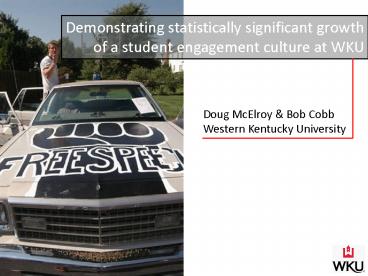Doug McElroy - PowerPoint PPT Presentation
1 / 13
Title:
Doug McElroy
Description:
How many non-major courses included knowledge or activities that will help you become a contributing citizen ? ... Non-course comm. involv. QEP 3. 6.19 ... – PowerPoint PPT presentation
Number of Views:43
Avg rating:3.0/5.0
Title: Doug McElroy
1
Demonstrating statistically significant growth of
a student engagement culture at WKU
Doug McElroy Bob Cobb Western Kentucky
University
2
The question at issue
To what extent have students university
experiences enhanced their civic knowledge,
skills and perspectives ?
3
Not all civic outcomes are equally amenable to
assessment
Civic Knowledge Awareness of world issues
To what extent do students understand the
factual basis of an issue ? To what
extent do students appreciate different points of
view ? To what extent do students
recognize an issues importance and connectedness
? Civic Skills Capacity to effect social
change To what extent are students
aware of strategies for catalyzing change ?
To what extent have students practiced civic
skills ? To what extent have students
been effective at enacting social change ? Civic
Perspectives Commitment to social change
To what extent do students appreciate the
role of civic contribution ? To what
extent do certain issues resonate with students
? To what extent are students motivated
to be socially-responsible citizens ?
4
Learning is cumulative, and is best assessed as
such
5
At WKU, academic priorities are driven by our QEP
Engaging Students for Success in a Global Society
(2005) Students will engage with communities
other than their own in purposeful learning
activities that explicitly address their capacity
and responsibility to contribute to society in
positive ways. Linked to three targeted student
learning outcomes 1. Students will
demonstrate their capacity to apply knowledge and
training to address relevant
concerns in community or society. skills
2. Students will demonstrate respect for
diversity of peoples, ideas and
cultures. knowledge 3. Students
will demonstrate awareness of their opportunities
as responsible citizens living
and working in a global society. perspectives
6
Our approach to assessing QEP outcomes is
multivariate
WKU Student Engagement Survey (WKUSES)
Given each year to all juniors and seniors
45 university-wide items, generally on a 4-5
point scale Includes both process
(input) and outcomes indicators Student
perceptions of aspects of their WKU
Experience Baseline factor analysis and annual
projection of data onto factors PCA
with Varimax rotation to identify distinct
engagement factors Generation of scores
on new axes by department Annual
projection of data onto factors to track program
enhancement Significance testing of
factor scores by year using ANOVA Incorporation
of holistic indicators of engaged learning
4 questions representing university QEP
student learning outcomes Tracking of
changes in mean responses by department
Significance testing of mean responses by year
using ANOVA
7
We rely on statistics to link experiences with
outcomes
8
WKUSES items query diverse aspects of students
WKU Experience
To what extent has your coursework contributed to
your voting in elections ?
While at WKU, how often have you participated in
practicum courses, internships, co-ops, clinical
assignments or field experiences ?
While at WKU, how often have you participated in
study abroad or other international activities ?
While at WKU, how often have you performed
community service/volunteerism activities ?
While at WKU, how often have you interacted with
people of different backgrounds or cultures ?
How many courses in your major included knowledge
or activities that will help you become a
contributing citizen ?
How many non-major courses included knowledge or
activities that will help you become a
contributing citizen ?
9
WKUs student engagement culture has grown
significantly
Students perceptions of their learning have
increased significantly since 2005 23
of 45 individual WKUSES items (51 ) showed
significant increases 21 of these 45
items are directly related to QEP student
learning outcomes Of these, 14 (67 )
have increased significantly since
2005 Multivariate analyses identified 10 factors
of engagement Accounted for over 61
of the total variation in the 2005 data set
6 of 10 factors (60 ) directly reflect QEP
student learning outcomes Of these, 4
(67 ) have increased significantly since 2005
10
Engagement factors amplify the impact of related
experiences
11
QEP response variables show dramatic change in
just two years
12
So what can we take from all this ?
For WKU 1. Students are recognizing
the value of engagement activities to their
professional and personal development
2. Departments and programs can use the
results to aid in their strategic
implementation and assessment of QEP student
learning outcomes 3. An intentional
and directed focus on an engaged learning
paradigm can rapidly pay
dividends More generally 1. You
dont have to assess every activity directly
2. You dont have to know exactly what
outcome a given activity will address
3. A multivariate approach provides a powerful,
hypothesis-driven paradigm for
student learning assessment
13
(No Transcript)































